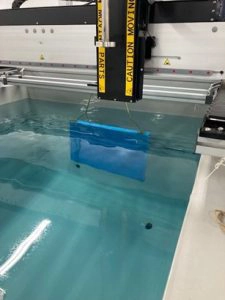Precision Acoustics has teamed up with the Manufacturing Technology Centre (MTC) to apply additive manufacturing techniques to produce an anechoic tile for underwater acoustic measurements.
Materials that prevent echoes from surfaces have been used since the 1930s. Their original use was to mimic the open air without the need to conduct measurements outside and risk noise interference from passers-by or other sources. The same principle can be applied to underwater acoustics to recreate open ocean conditions without heading out to sea. Benefits include the fact that conditions in a lab are more consistent than the open ocean, it is cheaper to conduct experiments and there isn’t a risk of sea sickness amongst the scientists in the research team.
As a major supplier to MHz ultrasound markets, the we wanted to expand our offering and set about developing a new anechoic test tank lining for underwater acoustics.
Originally, the our team planned to produce the anechoic material using a moulding process. Early attempts were unsuccessful due to the challenges posed by the geometry and size of the lining. The only viable solution was to 3D print the lining in sections, but this caused issues with the ease and precision of assembly, in addition to achieving the required finish to the product.
 Eventually, we approached the High Value Manufacturing Catapult – a project established by Innovate UK to connect businesses with world class research and development facilities and expertise to help grown business ideas. It introduced us to the MTC to explore alternative solutions.
Eventually, we approached the High Value Manufacturing Catapult – a project established by Innovate UK to connect businesses with world class research and development facilities and expertise to help grown business ideas. It introduced us to the MTC to explore alternative solutions.
MTC was able to outline a strategy for manufacture based on technology and material selection. Working in collaboration with ourselves, MTC determined a detailed assessment process. Its additive manufacturing team investigated the use of the Stratasys Objet 1000, a large build envelope 3D printer to produce a full-size lining template out of a simulated polypropylene material called Rigur RGD450.
The mechanical properties and surface finish of the template enabled us to produce a soft mould from silicone. The team was uncertain about some areas of the design and built smaller versions to test the process. For example, there were concerns that the geometrical intricacies in the design might mean that some features of the lining template were at risk of breaking in the silicone mould.
The material was the most significant contributor to the overall cost of producing the template, so the MTC team built smaller test parts before committing to a full-size version. The iterations also tested against warpage, which was a cause for concern due to the size of the product when manufactured at full size.
The process included design adjustments during the three-trial phases, before the proposed final specification of the full-sized template was agreed.
Once a suitable material and technology combination was reached, the lining template not only met product specification but was delivered cost-effectively. The final build was a success, and an operational anechoic lining was manufactured. The project was completed within a short timeframe, allowing our team to get the new product to market and reach new customers and market sectors.
The collaboration brought together the MTC team, drawing on additive manufacturing expertise and Precision Acoustics’ measurement capabilities to develop a viable solution for a specialist challenge.
for a specialist challenge.
Reflecting on the co-operation, Chris Burchell, Research Engineer at the MTC, praised their partner.
“We really enjoyed working with Megan and the team at Precision Acoustics – they had a clear target that they wanted to achieve and they were very engaged throughout the project,” he said. “It was a true collaboration, which enabled us to work through the design iterations at pace and develop the final product efficiently and to a specification that overcame all the challenges [Precision Acoustics] faced previously,” he added.
The collaboration also enriched our understanding of additive manufacturing to support future product development.
“The support, advice, and expertise the MTC team offered throughout was invaluable, and the outcome was one that we wouldn’t have been able to achieve otherwise,” said Megan Jenkinson-Garner, Research Physicist at Precision Acoustics. “Together, we’ve been able to develop a solution that enables us to reach new markets and engage with more customers, whilst building our own understanding and knowledge of additive manufacturing, which will undoubtedly benefit us in future projects.”


